Sanibonani bekunene,
That means hello everyone in SiSwati, the local language in Swaziland. Technically it means hello people of the right hand, but hey, that's how they greet there.
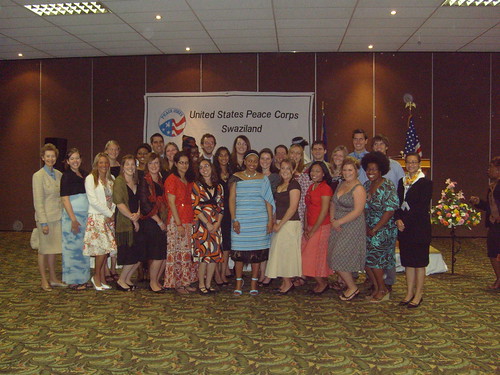
I'm back home now, after spending 13 months there. I resigned due to health concerns combined with the fact that I was not doing as much as I had hoped in the program. It was a tough decision, but I think it was for the best.
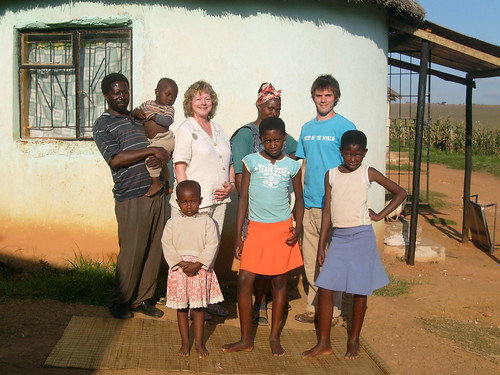
Swaziland was an interesting country to live in; far different than anywhere I've ever been before. It certainly has its share of trouble, with the world's highest HIV/AIDS and TB rates, as well as the fact that 69% of Swazis live on less than US$1 per day (coincidently, around 70% of the country is rural). There was a lot of good there, too, though. Swazis are generally genuinely good people. They're very helpful, and giving, even when they have very little. The main staple of their diet is corn porridge, which they call maize. Some families eat it for every meal. The majority of rural Swazis grow corn.
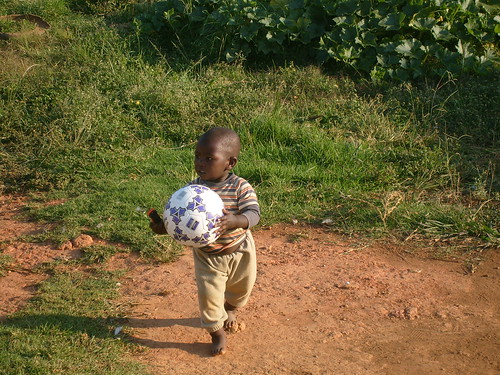
Since this is the long version, I'll start at the beginning. Training lasted 9 weeks, and mainly focused on language and culture, with some medical, safety, and programming (how to do our jobs, HIV/AIDS community health worker). We stayed with host families during training, close to a town in the south of the country called Nhlangano. I stayed with a Dlamini family, which is the surname of the royal family. It is by far the most common last name in the country, comprising over 10% of the country, I've heard. This is because kings generally have many, many children. The previous king, Sobuza II had 210 children from 70 wives. The current king, Mswati III, has a "paltry" 22 children from 12 wives, although he's only 40, so he's still got a few years to catch up. My host family gave me the Swazi name Sibusiso, which means "blessing." Each volunteer got a Swazi name, as not all Swazis were able to pronounce our English names. Mine was especially difficult due to the fact that there are no r's in SiSwati.
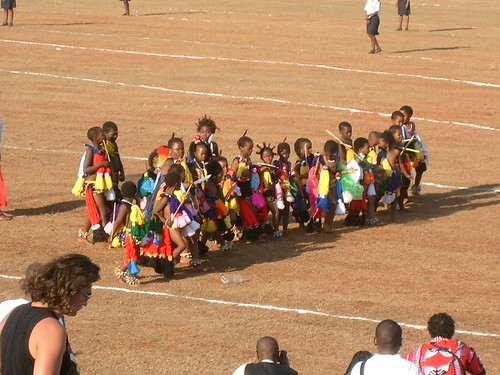
My group was the 5th Peace Corps group to come to Swaziland under the new HIV/AIDS program. There was an education program there a couple decades ago. Originally there were 25 volunteers in my group, 20 girls and 5 guys (sucks for the girls, huh?). We all made it to swear-in in August (a first for this particular program), but 5 of the girls (and I) have since left, for various reasons. Three did not feel safe at site (one was constantly harassed by drunk men at site, another heard a rumor that people in her community had tried to poison the previous volunteer at her site, and the other had a neighbor who was hacked up, a grandmother, with the police report concluding that it was caused by spirits). One had family issues back home and wanted to be there. The other one developed back problems and was unable to move very well, so she was medically separated.
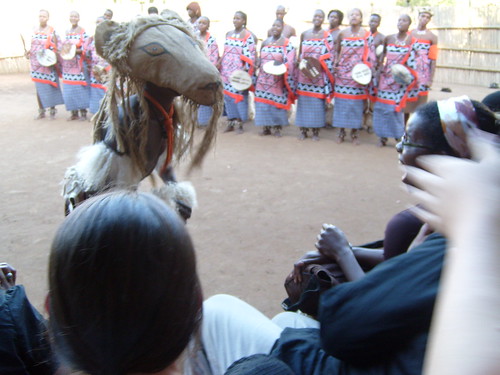
Probably the most interesting story from training was the time my group went to visit a traditional healer, or sangoma. There are two types of traditional healers in Swaziland: inyangas and sangomas. Inyangas are more healers; they use herbs and other natural remedies to help sick people. Sangomas are more like what people would think of when they think of witch doctors: they provide services such as fortune telling, finding lost items, freeing people from curses, and the like. The first thing my group did when we got to the sangoma's homestead was to hide things for her to find. Probably a little under half of our group hid something for her to find, the most common item being candy. When she came out, her assistants proceeded to play drums and shake makeshift rattles, and she went into a trance. While in a trance, she spoke in a much deeper voice, and kneeled down and bounced a lot. She was also quite confrontational and angry. It was a little intimidating. At one point in her act she took off her shirt, which was pretty rough on us Americans, considering she was a rather large and old woman (breasts are not considered a sexual body part in Swaziland). Eventually she started telling us who had hidden things, but it was obvious she was guessing. She got about half of her guesses right. When it was over she stormed off to her hut, and one of her assistants informed us that she felt insulted by our group. She said that candy was for children, and that we should have hid meat (how exactly we were supposed to know that was unclear). She also said that we didn't take her seriously, which was true, but I would say that we hid it well, and did our best to be respectful. She refused to read our fortunes, which she had previously agreed to.
Eventually, after much convincing by Swazi Peace Corps staff, she agreed to read one of our fortunes, provided that we did it topless, to prove that we were taking it seriously. Another volunteer, Brett, and I offered to do it, as we were guys, but one of the girls in our group, Meredith, insisted on doing it. Luckily, they let her put on a lihiya, a traditional Swazi piece of cloth (which is very versatile, by the way, it can be a top, a bottom, both, a head wrap, and many other things). The sangoma came out, still in a trance, and went through a whole act in her deep, menacing voice, then started in on Meredith. She had a mini-feather duster in one hand and a butter knife in the other, and proceeded to dust and poke at Meredith, periodically sticking her head in Mer's chest and crotch. This went on for a while, until finally she revealed her amazing fortune: that sometimes Meredith gets headaches, sometimes she gets stomachaches, and sometimes she gets gassy. Pretty lame. Then she came out of her trance, and we had a Q&A session through a translator. During this session, she was asked if she can cure AIDS, to which she replied that she can, but everyone who has come to her with the disease has come to her too late to be cured. She also made the claim that AIDS is caused by contraceptives. Afterwards, during the debrief, I suggested to the Peace Corps that no American taxpayer money ever go to this woman again.
After training was finished, we were all sworn as official Peace Corps Volunteers at the Royal Swazi Sun Hotel, the nicest hotel in the country. One of the king's wives, as well as several heads of NGOs, were in attendance. The food was spectacular, and the place was lovely.
When it was time for us to go to our permanent sites, they tried to put me at a place called Lushikishini, but I did not feel safe there. The previous volunteer had been robbed by the host family, transportation was not always available, and there were rumors that one of the men on the homestead had held up a khombi (a 15-seater van used for public transportation, quite common in Swaziland). So the Peace Corps moved me to a place called Nsangwini (which translates to marijuana, by the way), which is southeast of Mankayane, if you want to try and locate it on a map. It was the most rural area occupied by a volunteer in Swaziland, 3+ hours by bus away from a bigger town, depending on how crowded the bus was, how many times the bus broke down on the way, and the weather. It was also the only site without cell phone reception at the homestead. I had to walk up a hill for 10-15 minutes to get reception. Finally, it was one of few homesteads without electricity. I did luck out with my host family, though. They were incredibly nice and welcoming people. Not everyone liked, or even really talked to, their host family, but I got along great with mine. The dad on the homestead was Sipho Maseko (k's are pronounced as g's in SiSwati), who was a veterinary assistant. That meant that he was in charge of dip tanks for cattle in the area. He essentially made cows walk the plank into large tanks filled with chemicals. Swaziland was paranoid about cow disease, as a large chunk of their country was quarantined several years back due to foot and mouth disease. That part was taken by South Africa, and never returned. Swaziland is fighting to get it back in international court, but there is little chance of this happening.
Back to my host family. The mom on the homestead was named Gcebile (c's are clicks in SiSwati). She took care of the kids, but she wants to become a government driver (such as an ambulance driver) after all of the kids start school. The children were Qondile, 13 (q's are also clicks in SiSwati), Noxolo (x's are also clicks in SiSwati), 11, Teyise, 5, and Sihlanguseyise, 1. The last was the only boy. The first two attended primary (elementary) school, and the latter two were not in school yet, although Teyise will start next year. The mom and dad on the homestay both spoke good English, so I was able to get to know both of them pretty well. They were definitely an interesting mix of modern and traditional, as were most Swazis. When I would have a friend spend the night who was a girl, they would have no problem with the fact that a guy and a girl were sleeping in the same room, but after the friend would leave, Sipho would always ask me if I was going to marry her.
I lived in what is known as a rondevaal (round house), with a thatch (grass) roof. Many other volunteers had corrugated iron (tin) roofs, which kept the house hot in the summer and cold in the winter, so I was actually happy to have a grass roof. A lot of people have asked what I ate there. I had a gas stove, so I pretty much ate whatever I could cook on that. They had grocery stores in town, so I would just buy food there and take it back home. At first my room was pretty empty, with just a bed and a table left over from the previous volunteer, but I added a lot to it. I bought a kitchen unit and a wardrobe in town. I had a local carpenter make me two bookshelves (one for cooking instruments), some drawers, and a coffee table (the coffee table took about 6 months, though, which was ridiculous). I also bought a couch in town, which I got home by putting it on top of my bus. I saved a lot on delivery that way.
During the first three months as official volunteers, we were in a period known as "lockdown," where we weren't allowed to spend the night away from our respective sites, and we were not supposed to start any real work. Instead, we were to integrate into our communities and use a few of the "tools" they gave us to do so. One of these was called the homestead census, where we went to different homesteads in our community and asked them a series of questions about how their lives were, and what they thought were some problems in the community. Another was a survey a fellow volunteer and I did at our local high school (called Ekuphakameni Central High School) of students' knowledge of, and attitudes towards, HIV/AIDS. There was also a daily clock for students, so we could find out what a typical day was like for them. I also did one activity where I found out about all of the different projects going on in my community. Finally, I did one where I listed all of the different people and organizations that were active in my community.
After lockdown, I was finally free to start doing projects. One thing I did on a fairly consistent basis was I had a boys club at the high school. I taught them life skills, such as how to put on a condom, and general info about HIV/AIDS. We also hung out and had fun sometimes. They were really into volleyball. I taught them how to throw an American football, which was really fun, and funny. They all thought it was a rugby ball at first. The project we did that I was most proud of was when they started a petition to take back the local youth center, which was a place kids could hang out after school. The local government was using it to store food aid, so kids could not use it. It took a long time, but eventually the food was removed.
I also taught at the high school a number of times. I taught life skills, which was mainly related to HIV/AIDS. I taught them basic HIV/AIDS info, how to use male and female condoms, and also engaged in dialogue with them about HIV/AIDS. Classes there are all lecture, so they appreciated getting a chance to give their opinions on why HIV/AIDS is so prevalent in Swaziland, and what can be done to stop the pandemic.
A couple months after the end of lockdown, I held my first workshop in my chiefdom. I provided food (funded by PEPFAR, the President's Emergency Plan for AIDS Relief), and gave out a free UNICEF calendar as a gift, so a lot of people came. Officially 68 people signed in, but the real number was probably closer to 100. I had Population Services International (PSI) came to talk about condom use and the importance of testing for HIV/AIDS. They also tested 20 people for HIV. The Ministry of Health came and talked about prevention of mother to child transmission of HIV/AIDS. The Family Life Association discussed male circumcision (which is quite effective in preventing infection). Finally, I had a local drama group do a skit about the importance of family in the fight against AIDS. Overall, the event went really well!
PSI came back a few months later to do another event. Since I didn't provide food, it was far smaller, but still very worthwhile. Their main purpose was to do HIV testing, but they also talked about condom use again, and did demonstrations with both male and female condoms. In addition to this, they talked about a de-worming tablet they had, and sold a few (don't worry, it was very cheap, less than US 50 cents). They also gave away several boxes of condoms, which was a victory in itself in a country notorious for not using condoms. At the end of the day, 17 people tested, so I was happy.
One of the projects I did in my community that I am very proud of was to introduce condoms into my chiefdom. I went to an organization called the Mbabane Public Health Unit and picked up boxes of both male and female condoms for 13 different structures in my chiefdom. I distributed them to 3 shops, 3 neighborhood care points (where orphans and vulnerable children are fed, the community had meetings at these places sometimes), 2 markets, my kagogo center (started by NERCHA, a national organization, to combat AIDS, there's one kagogo center in every chiefdom), the local high school, the inkhundla (like a county office), a spaza phone (like a pay phone, but there's an actual little shack with an attendant), and the youth center. When I returned from picking up the condoms, my homestay mom asked me if she could have some for herself. At that moment I knew the aforementioned workshops had gotten through to people!
For my Christmas holiday, I met up with my friend Jen in Maputo, Mozambique. She had just finished a semester abroad in Tanzania. We visited a few museums, but mostly we just hung out on the beach. Swaziland is landlocked, so I was great to see a beach again.
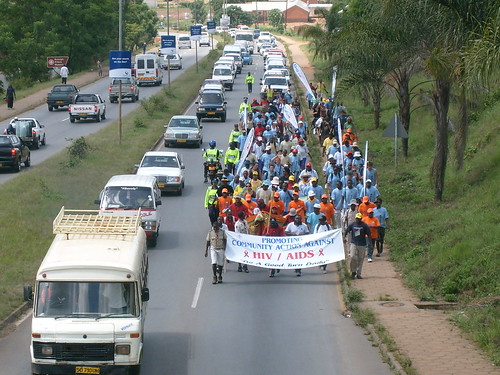
One of the more remarkable experiences of my time in the Peace Corps came this March when I, as well as around 120 other people (about 30 of which were other volunteers), walked across the country. It was about 127 miles and it took us 12 days to do. It was mainly organized by Peace Corps volunteers, with some help from UNICEF and NERCHA. We called it Walk the Nation, and the goal was to raise awareness of HIV/AIDS issues in rural communities. Each day we stopped at a different location to have an event, mostly at schools. At these events we had speakers, free testing, and skits on HIV/AIDS by a Red Cross drama group that was traveling with us. An HIV educator from Dallas-Ft. Worth named Judith Dillard flew all the way out to Swaziland to walk with us. It turns out Dallas-Ft Worth is a sister city to the capital city of Swaziland, Mbabane. Judith has been living with HIV for 18 years. She was a great speaker, and I thought it was great for Swazis to see someone who was open about their status, as so many Swazis are ashamed to admit they are positive due to stigma. Often when someone dies of AIDS there, the family members will lie about the cause of death and just say the person died of a headache or something. The walk was a success. Other NGO's even started holding walks of their own. It was funny because they also called them "Walk the Nation," like our event, but their walks would only last a day. Many Swazis still struggle with the English language.
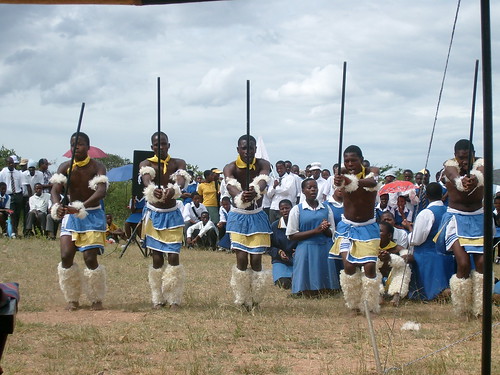
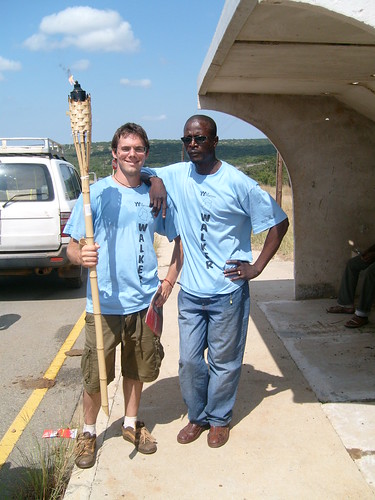
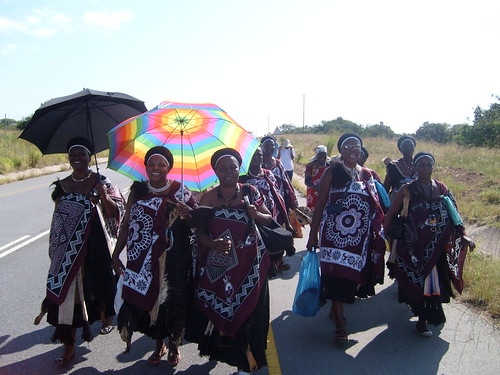
Another project I worked on while I was there was a bee-keeping project that was started by the previous volunteer at my site, Justine. I helped a group of entrepreneurs in my community, who called themselves Buhle Bemaswati, attain the funds to start a small bee-keeping business. They got all of the equipment necessary through a group called Swaziland Charitable Trust. I also helped them further their knowledge of bee-keeping by finding information on it and giving it to them. Honey was named the number one opportunity for small businesses in Swaziland by a business-oriented NGO called Technoserve, which gave a presentation at our training. The industry is struggling in the first world, so more supply is needed. Also, Swaziland is a great place for bees.
In late April, my parents came to visit me. It was great to see them after so long! It was also pretty fantastic to stay in a hotel for 5 days and have warm showers, a car, and good food. The most fun thing we did was to spend a day at a game park called Mkhaya, where we saw elephants, rhinos, zebras, giraffes, hippos, oryx, springbok (called gazelles here), and crocodiles. We also visited the national museum (yes, there was only one in the whole country) and a cultural village, where they wore traditional outfits, danced, sang, talked about the history of the country, and had a model traditional Swazi homestead, where they explained how traditional (i.e. rural) Swazis live. My parents also brought a laptop and helped me get a solar panel to charge it, which greatly improved my quality of life.
One project that I worked on with several volunteers from my area was a career fair, which we put on in the town of Mankayane. We had speakers come from 5 different professions and 2 universities. We also had workshops on how to write a CV (their version of a resume) and how to do a job interview. We threw in a speaker on HIV so that we could get PEPFAR funding for the event. Overall, the event went very well. Hundreds of students attended, and the ones I brought said they got a lot out of it.
Another event I helped out with was a girls' camp that was put on by a fellow volunteer named Shannon, who lived on the other side of the country. She held a 4-day long camp for about 40 girls in her high school to teach them about life skills and to empower them. I used my tae kwon do training to teach a few girls self defense. I also assisted in teaching about time management. The camp was really fun. It was like a kids camp back home, complete with cheers, songs, and dance. The girls were divided into groups, and each group had a name and a cheer. Also, they each came up with a song, dance, or skit that they performed at the end of the camp. Some of the girls I taught tae kwon do to incorporated it into their dance.
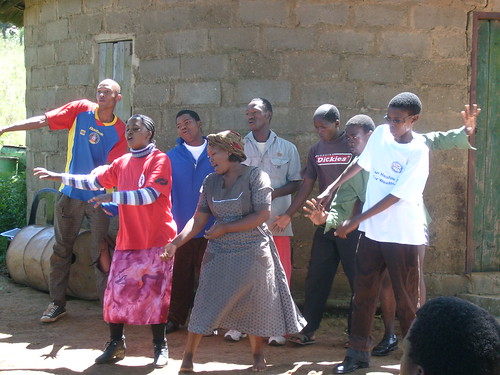
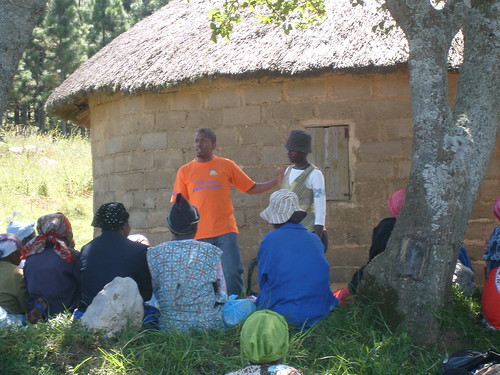
While I did live in a very rural place, I did get the chance to have fun fairly often. Generally, a few volunteers would get together on the weekend, go to a few clubs or bars, and stay at a backpackers (like a hostel). The nightlife wasn't great, but we all needed at least somewhere to unwind, especially with all the death we were constantly surrounded by. There was even the occasional concert in Swaziland. I went to one by a South African band called Freshly Ground, which was fantastic, although a little short. I also went to a world cup qualifier soccer game against Togo which ended up being Swaziland's first world cup qualifier win since 1992! The game was at the national stadium, Somhlolo, which seats 7,000 people, but 15,000 were in attendance. The crowd was nuts! I stormed the field afterward, which was really fun.
At the end of it all, I'm glad I went. I didn't make as much of a difference as I hoped I would. Despite how it may appear above, I wasn't generally that busy. No one project took up much of my time on a consistent basis. I was never given a specific assignment by the Peace Corps office there. The office had some serious issues, but that's another e-mail in itself. For the next group, they are trying something different. They are pairing up volunteers with kagogo secretaries. Kagogo centers are places set up in each chiefdom by a national organization called NERCHA to address HIV/AIDS issues in that chiefdom. Some are more effective than others; the office spoke with NERCHA to determine the most motivated kagogo secretaries in the country, although motivated is a relative term in Swaziland. I hope it works out, because our program was seriously lacking.
Despite this, it was a great experience overall. I learned so much while I was there. I learned what it's really like to live in a poor society, and to live in one devastated by HIV/AIDS. I also learned about international aid, about what is working and what is not. Aid dependence was a big problem in Swaziland, the number of people who asked me for money and candy was ludicrous. That's just scraping the surface. I also made some wonderful friendships that will hopefully last the rest of my days.
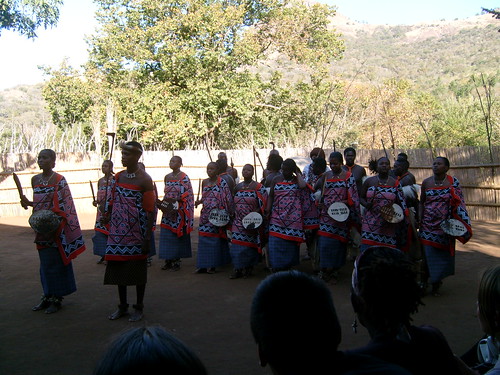
Well, that's probably enough. Thanks for reading it all. If you have any questions for about my experience, feel free to ask.
Salani Kahle (stay well),
Erik
P.S. I've been meaning to write an essay on democratic world government for awhile now, which I will probably do soon. If you're interested in that, let me know and I will send you a copy when I finish.
